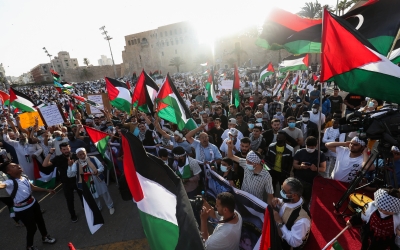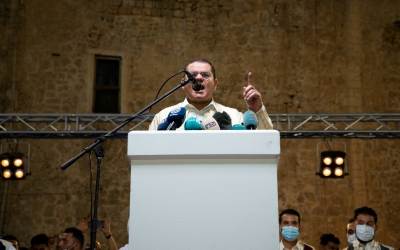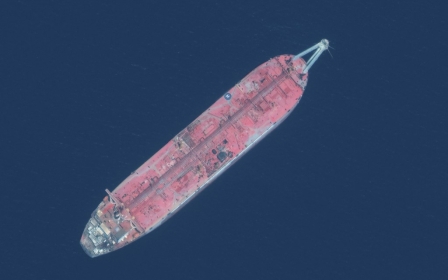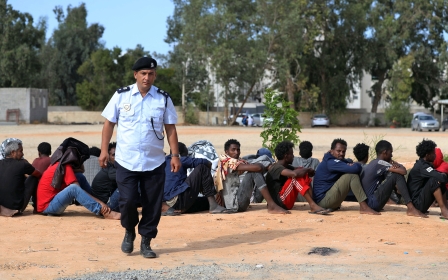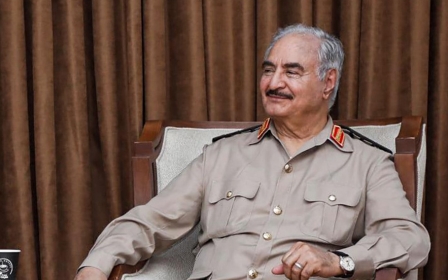Libya: Offshore platform deaths expose reality of neglected oil sector
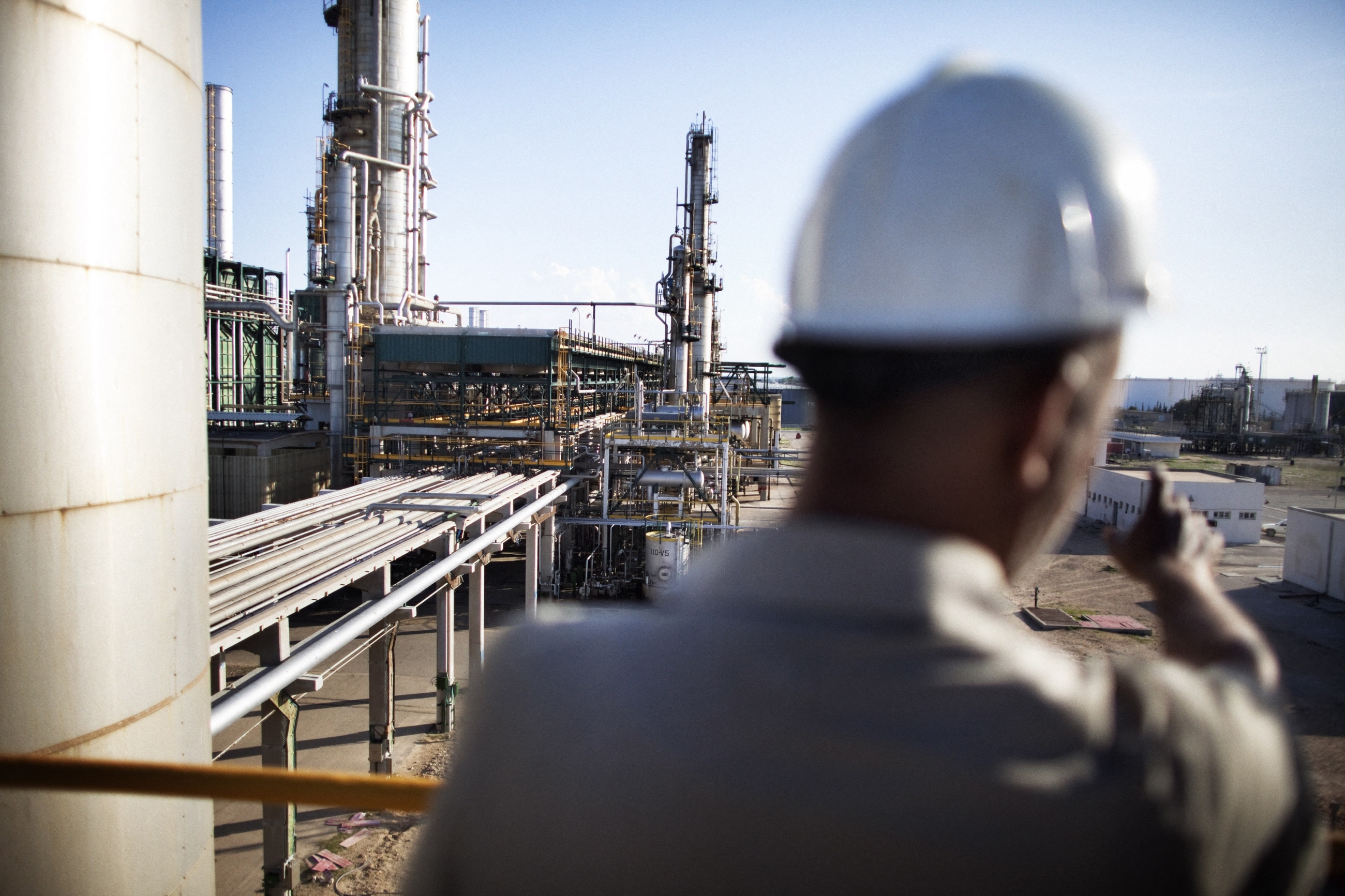
The death of four Tunisians last month at an offshore oil platform in Libya has highlighted concerns about the country’s ageing oil infrastructure, which has suffered a decade of neglect and repeated shutdowns.
The four workers were killed and another seriously injured on 5 November while working at Libya’s al-Bouri offshore oil platform, where they were trying to disconnect a redundant floating tank. The infrastructure connecting the tank to the platform collapsed after a metal cable snapped, plunging the workers and tons of steel into the sea.
The floating tank - named Suluq, after the Libyan town where resistance hero Omar al-Mukhtar was executed by Italian colonialists in 1931 - had been out of service for four years, having been replaced. It was sold, for disposal and scrapping, to a Libyan businessman, who had employed a Tunisian company to disconnect Suluq and bring it ashore.
Mellitah Oil and Gas, a joint venture between Italy’s Eni and Libya’s National Oil Corporation (NOC), which operates the al-Bouri platform, confirmed that although it provided assistance and support following the incident, it was not directly involved, as the vessel was owned by a third party.
A Libyan shipping source told Middle East Eye that Suluq had been attached to the platform since 1988, meaning any connecting infrastructure was most likely rusted solid. A plan outlining removal procedures, including safety factors and anti-pollution measures, should have been submitted prior to any work being carried out. This, he suggested, had either been inadequate, not carefully studied or not properly implemented, leading to the accident and loss of life.
A month earlier, a nearby oil platform operated by Libya’s Mabruk Oil Operation was the scene of a significant oil spill, following a safety breach. “There was a leak in the platform’s rubber loading hose, which was hooked up to an oil tanker. The hose should have been checked before loading but there was some kind of mistake and it leaked, causing a spill,” an engineer working at the platform told MEE. (Mabruk did not reply to a request for comment.)
Like other oil engineers MEE interviewed, he spoke on condition of anonymity, as he was not authorised to speak to the press and feared repercussions in the workplace. “The NOC opened an investigation into the incident but there has been no outcome yet,” he said.
Although the NOC announced that the slick was brought swiftly under control and had not reached Libya’s beaches, the engineer said he believed the shoreline had been contaminated. Independently studied satellite images also indicated that the spill had not been contained as effectively as the NOC claimed. The NOC did not reply to a request for comment.
These recent incidents at offshore platforms highlight safety issues for the country’s hydrocarbon sector, upon which Libya’s economy depends. Worries extend to coastal and desert facilities, parts of which, employees claim, are scarcely fit for purpose, due to inactivity and a long-term lack of adequate maintenance.
'The government wants to keep the oil flowing… but you can’t do that with facilities that haven’t been operating for a decade and haven’t been properly maintained'
- Ahmed, oil engineer
“There are real safety concerns at the facility where I work, mainly because of corrosion to steel structures,” oil engineer Ahmed (not his real name) told MEE. “The government wants the revenue from our hydrocarbons, so it wants to keep the oil flowing and all available facilities to be restarted; but you can’t do that with facilities that haven’t been operating for a decade and haven’t been properly maintained.”
Inadequate maintenance across Libya’s ageing oil facilities and the lack of economic support to fund such work is no secret, and the NOC has repeatedly and openly spoken out about this.
"It became clear to us years ago, during our maintenance of leaks, that we need to allocate budgets urgently to rehabilitate our deteriorated infrastructure. We explained the situation to the successive governments as well as the Ministry of Oil and Gas,” said NOC chairman Mustafa Sanalla, in a statement published on the company’s website. This followed a serious inland pipeline rupture, detected in late October after a sudden drop of pressure, which required temporary closure and urgent repairs.
“Despite the clarification of the situation in all its dimensions and its repercussions on production and revenues, we have yet to receive a single dirham,” he said.
The UN-backed Government of National Unity (GNU), established in March this year, has not had its requested LYD 96 billion ($21 billion) budget approved by parliament, leaving it able to spend only the equivalent of the previous year’s LYD 38.5 billion ($8.5 billion) budget. Any money disbursed to the NOC has apparently been able to cover only the basic running costs and is nowhere near the sums required to adequately maintain, let alone upgrade, Libya’s hydrocarbon sector.
"Reducing or postponing budgets has caused huge losses, and preserving the country's oil capabilities is an absolute priority,” said Sanalla. “The delay in providing budgets has exacerbated the difficulties we are facing. The working teams of the operating companies are working day and night to limit the continuation of leaks.”
Oil flowing, but for how long?
Libya lost billions in oil revenue during an eight-month blockade of key facilities during 2020 by supporters of Khalifa Haftar, commander of the Libyan National Army. After a rapprochement between rival governments, followed by the establishment of the GNU, the NOC has brought Libya’s oil output back up to 1.3 million barrels per day (bpd) and there are ambitions to ramp this up to 2 million bpd by the end of 2022.
The tentative stability brought by the GNU has encouraged international oil companies to return to their Libya concessions, including Russia’s Tatneft, after a 10-year hiatus. France’s TotalEnergies has pledged investments totalling $2 billion and Eni is also planning considerable investment.
Oil facilities operated as joint ventures between the NOC and foreign companies are said to be in better condition than those operated solely by the NOC. However, the country’s complicated hydrocarbon layout means there is much shared infrastructure, including pipelines. And, since Libya’s oil went back on stream, concerns raised by the NOC about pipeline corrosion have been largely ignored.
Ahmed said a lack of understanding of the intricacies of oil operations has permeated Libya’s political echelons. “They think the oil facilities were just resting and can be quickly restarted. But, during the oil blockade, pipelines were used for oil storage because the tanks were all full,” he said.
“Pipelines are thinner than tanks and not designed for storage, and as soon as they were operating at full capacity, the leaks started. Every time there is a leak, there’s an oil spillage, and the NOC has to shut down that section and weld up the leak. And this process keeps repeating - leaks, shutdowns and repairs.”
Outdated technologies are also increasingly becoming an issue, including at the Ras Lanuf facility, located in the middle of Libya’s broad coastline, where efforts are under way to restart petrochemical plants by March 2022.
“The polyethylene tank dates from the 1990s and has some corrosion but the ethylene tank is even older, from the 1980s, and needs many new parts, but such spare parts are now obsolete and will probably have to be custom-made, which will be very expensive,” said oil engineer Hisham, also a pseudonym. “Technologies have advanced quickly in the last 20 years, moving from pneumatic systems to fully electronic systems, and all our electronic equipment is now completely out of date.”
Hisham said other countries also still using older infrastructure had been able to gradually upgrade their functioning systems. But much of Libya’s hydrocarbon industry stalled following the 2011 uprising which overthrew Muammar Gaddafi, and that standstill has lasted a decade. “The oil industry has progressed and left us behind,” he said.
NOC-government relations deteriorating
The GNU’s initial success at temporarily stabilising volatile Libya has not extended to its crucial relationship with the NOC. Sanalla managed to maintain neutrality during the complex six years when Libya had rival governments, often battling against one another in a series of civil conflicts, some of which targeted oil infrastructure. But relations between the new government and the NOC have been deteriorating.
“The problems Libya’s oil sector currently faces have become very complex. We have maintenance issues, financial problems and now also political problems,” Ahmed said.
The GNU’s Oil Minister, Mohamed Oun, has twice suspended Sanalla, most recently on 19 October for alleged “non-compliance with procedures and controls for obtaining prior permission when undertaking an official mission”. These suspensions have not so far had any meaningful impact upon Sanalla’s position, but other senior NOC figures have also been targeted.
'A systematic war is being waged by a coalition of militias, smugglers, corrupt figures or politicians, ideologies and stakeholders against the National Oil Corporation'
- Statement by the NOC
In late October, NOC board member Abulgasem Shengheer was arrested at Tripoli’s Mitiga Airport, sparking a day-long countrywide strike across the country’s oil facilities against his detention. A week later, Libya’s Public Prosecution said that Shengheer was among three NOC employees being held in custody pending investigations into allegations of fraud.
Following Shengheer’s detention, the NOC released a strongly worded statement, claiming: “A systematic war is being waged by a coalition of militias, smugglers, corrupt figures or politicians, ideologies and stakeholders against the National Oil Corporation (NOC) in order to blackmail, infiltrate, politicize and redirect it from the neutral position it has maintained over the past years for the benefit all Libyans.”
Libya’s complex post-2011 political and security spheres, parts of which have become enmeshed in corruption, organised crime and militia rule, may yet pose further threats to the country’s oil sector.
This article is available in French on Middle East Eye French edition.
Middle East Eye delivers independent and unrivalled coverage and analysis of the Middle East, North Africa and beyond. To learn more about republishing this content and the associated fees, please fill out this form. More about MEE can be found here.


